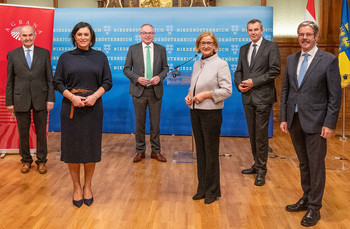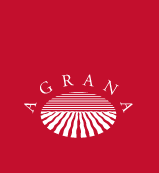Supervisory Board gives green light for sugar refinery in Leopoldsdorf to continue operations in 2021
Data: 27.11.2020
Due to growing contracts concluded for 2021 covering over 38,200 hectares, the processing of sugar beet at both sugar refineries in Austria is commercially viable. For this reason, the Supervisory Board of AGRANA Beteiligungs-AG approved the continuing operation of the Leopoldsdorf site at its meeting on 27.11.2020.
Erwin Hameseder, Chairman of the Supervisory Board of AGRANA Beteiligungs-AG:
“Today’s resolution shows what can be achieved when key business and political players cooperate at the provincial and national levels. We have jointly managed to safeguard valuable jobs and regional value added. As a result of the increase in the beet-growing area for the 2021 harvest in particular, today’s resolution by the Supervisory Board to continue operating the sugar refinery in Leopoldsdorf is excellent news. I would like to thank everyone involved for making this clear decision possible.”
Johann Marihart, CEO of AGRANA Beteiligungs-AG:
“We are delighted that we have been able so early to agree with the beet growers on the commitment of more than 38,000 hectares of beet-growing land which are necessary for the commercially viable capacity utilisation of two Austrian sugar refineries. We offer beet prices which make beet growing attractive. We have always invested in ensuring the competitiveness of both Austrian sugar production sites. In the past five years, these investments in Leopoldsdorf and Tulln amounted to a total of € 77 million. The focus of these investments was on energy-efficient technologies and greater efficiency in general. In a European comparison, both sites are among the refineries with the smallest CO2 footprints.”
Elisabeth Köstinger, Federal Minister for Agriculture, Regions and Tourism:
“The decisive factor for me is safeguarding local sugar production and self-sufficiency. This necessitates the site in Leopoldsdorf and the farmers who supply it. Growing sugar beet has no longer been appealing for many farmers in recent years. Pest-related damage, falling prices and production losses were decisive here. Sugar production was seriously jeopardised. Nonetheless, our farmers have managed it. In a major joint effort, we have again increased the beet-growing area to over 38,000 hectares. As a result, these farms have laid the foundations for maintaining the site in Leopoldsdorf. This success means that we are not only jointly underpinning beet growing in Austria but are also making a significant contribution to safeguarding self-sufficiency in terms of sugar. My thanks go to AGRANA for this affirmation.”
Johanna Mikl-Leitner, Lower Austrian Provincial Governor:
“Anyone who claims to support our farmers and local food production also needs to ensure suitable conditions. Our solidarity in saving Austrian sugar relies on a bonus for resuming growing, increased growing areas and safeguarding the future of the Leopoldsdorf site. We owe this to our farmers, production sites and, ultimately, the consumers who want to buy regional products from farms, grocery stores or supermarkets.”
Ernst Karpfinger, President of the Austrian Sugar Beet Growers Association:
“I am relieved by the decision reached today by the Supervisory Board. This means that 150 jobs and the self-sufficiency of Austria in terms of domestic sugar have been secured. My particular thanks go to the politicians whose agreement with the farmers provides a guarantee that they will receive financial support if they have to replant after pest infestation and also the commitment to crop protection. I am proud of our members since their willingness to increase the growing area is clear proof of cooperative solidarity in challenging times. Maintaining every processing site is important when it comes to diversified crop rotation and regional production.”
Strong economic footprint
The economic footprint of AGRANA in its sugar division is considerably greater than the jobs it creates directly. In addition to approximately 900 direct jobs throughout Austria, there are a further 1,900 indirect jobs due to the upstream inputs from various sectors, particularly agriculture. As a result, the direct added value in the sugar segment amounting to € 80 million is more than doubled to around € 180 million by means of commodity purchases as well as downstream production and consumption-related spending.
Around 25,000 metric tonnes of sugar beet grown by Austrian contract farmers are processed daily at the Austrian sugar refineries in Leopoldsdorf and Tulln during campaigns spanning around four months (October to January). Besides the refinery and administration departments, the Tulln site also houses the centralised packaging centre with 20,000 pallet bays where all the sugar varieties available at retail outlets in Austria under the „Wiener Zucker“ brand, as well as special varieties for our Eastern European neighbours, are produced, packaged, stored and shipped. Sugar shipments from the Leopoldsdorf site are mainly for the food industry and shipped using road tankers or in big bags and sacks.
Only “Wiener Zucker“ is sugar from Austria
When it comes to sugar, AGRANA relies on speciality products in the form of an extensive product portfolio. Over 30 different varieties of sugar are produced under the „Wiener Zucker“ brand, including gelling and icing sugar as well as sugar cubes. „Wiener Zucker“ has also been available as organic products since 2008. Even in the case of conventional „Wiener Zucker“ products, the entire production process is free of chemical disinfectants; relying instead on natural tree and hop extracts. The „Wiener Zucker“ brand stands not only for diversity and top product quality but for the products’ Austrian origins in particular. Because „Wiener Zucker“ is made exclusively from sugar beet grown in Austria.
